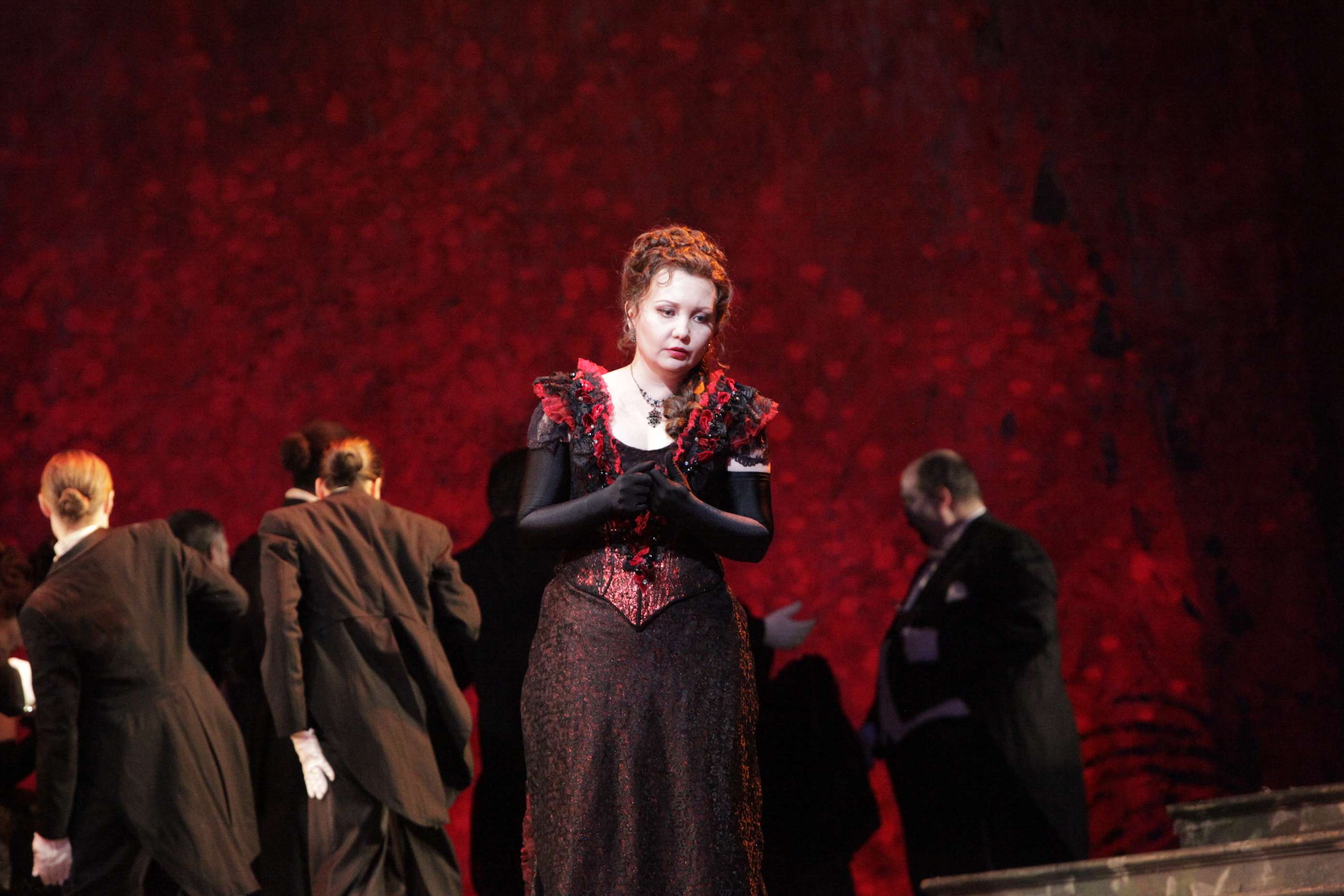|
Back
A Courtesan's Triumph Houston
Brown Theater, Wortham Theater Center
01/27/2012 - and Januray 29, February 01*, 04, 08, 10, 12, 2012
Giuseppe Verdi: La traviata
Albina Shagimuratova (Violetta Valéry), Catherine Martin (Flora Bervoix), Mark Diamond (Marquese d'Obigny), Boris Dyakov (Baron Douphol), Nicholas Masters (Doctor Grenvil), Scott Quinn (Gastone, Visconte de Letourières), Chad Shelton (Alfredo Germont), Brittany Wheeler (Annina), Brendan Tuohy (Giuseppe/Flora's Servant), Giovanni Meoni (Giorgio Germont), Keenan Manceaux (Commissioner)
Houston Grand Opera Orchestra and Chorus, Patrick Summers (conductor)
Daniel Slater (Director), Desmond Heeley (Set and Costume Designer), Michael James Clark (Lighting Designer)

A. Shagimuratova (© Felix Sanchez)
We go see La traviata to hear the role of Violetta Valéry. The casting of this role breathes life into the entire piece and can conquer almost any other misgivings one has about any given production. Houston Grand Opera features the ideal Violetta in Albina Shagimuratova's, whose presence in Houston has been a constant crescendo. Combining all of the wonderful aspects of her impassioned Gilda in 2009's Rigoletto to her technically stunning and emotionally involved Lucia in 2011, her Violetta becomes a personal statement, with distinctive interpretive nuances that make this ubiquitous role her own.
Without Shagimuratova, this production could be a let-down. This isn't to say that the other voices aren't effective, or that the chorus or orchestra play poorly. Indeed, the ensemble numbers are on par with HGO's typical, extraordinary standard. And in several of the other roles, there is vocal splendor. Giovanni Meoni's Giorgio wins pride of place among the male leads. The second act can sometimes seem perfunctory and curious, as if it's merely there to move the plot along. Giorgio's sudden mood swings often fail to convince, and his arias aren't as immediately memorable as the steady barrage of hits that runs through the first act. Not so here. Meoni is the perfect foil for Shagimuratova in the first scene, and their interaction becomes a focal point of the production. Meoni sings with a large, round sound, perfect intonation and diction and a menacing snivel as required. His alpha presence catalyzes some stunningly subdued singing from Shagimuratova. "Non amarlo ditegli" is his cruel command, and her response, "Nol crederà" is floated so ethereally that the entire audience leans in to hear it, lest they miss an epiphany.
Chad Shelton is the third tenor cast as Alfredo in this production, and his performance is uneven. At its best he is an engaging, thoroughly professional actor-singer, as in his snappy, perfectly placed grace-notes in the opening act's brindisi. But this is offset by shaky intonation at times, as in the opening phrase of "Un dì felice." In a sense, this heightens the naivety of his character here and, indeed, by the end of the evening Shelton's voice is secure and confident. The giddy adolescent love and its accompanying vocal shakes have been pushed aside by the machinations of the plot and the reality of a soulmate lost.
Smaller roles make good use of HGO's studio artists. Brittany Wheeler is always a pleasure to hear, and her Annina holds her own against Shagimuratova in their limited interactions. Boris Dyakov's Baron is physically and vocally vitriolic in just the right degrees.
The night, however, truly belongs to Shagimuratova. From her zippy run through "Sempre libera"--capped by an ecstatically extended, perfectly pitched high E-flat--to her truly hollow, eery iterations of "Prendi, quest' è l'immagine," she integrates flawless vocal technique, risky and convincing interpretive choices and star-quality acting.
The HGO chorus is always spot-on in its singing, but the biological, undulating movements choreographed on it are oddly unsettling despite their impressive execution. It seems that director Daniel Slater is trying, unnecessarily, to "sex up" the opera, or offer some sort of scathing commentary on the bourgeoisie. Slater also doesn't trust his audience to catch the foreshadowing in the first act of Violetta's demise, but he should. The introduction of a "Ghost of Violetta" that appears every time Violetta is reminded of her illness is heavy-handed and pandering. The sets, too, are beautiful, but their hazy, Impressionistic colorations aren't appropriate to the entire story, only making good sense in the last act. Patrick Summers leads excellently from the pit and is especially keen to Shagimuratova's rhythmic flexibility. The HGO orchestra once more shows its prowess in Italian opera, with luxurious string melodies and furbelows countered by round, perfectly blended brass sounds.
Marcus Karl Maroney
|